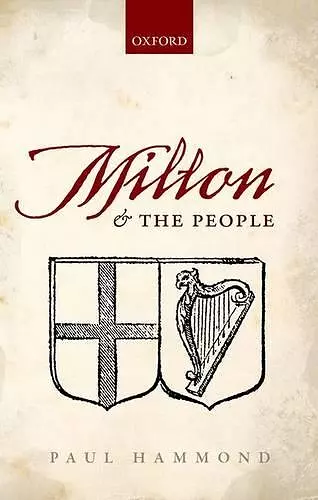Milton and the People
Format:Hardback
Publisher:Oxford University Press
Published:29th May '14
Currently unavailable, and unfortunately no date known when it will be back

Who are 'the people' in Milton's writing? They figure prominently in his texts from early youth to late maturity, in his poetry and in his prose works; they are invoked as the sovereign power in the state and have the right to overthrow tyrants; they are also, as God's chosen people, the guardians of the true Protestant path against those who would corrupt or destroy the Reformation. They are entrusted with the preservation of liberty in both the secular and the spiritual spheres. And yet Milton is uncomfortably aware that the people are rarely sufficiently moral, pure, intelligent, or energetic to discharge those responsibilities which his political theory and his theology would place upon them. When given the freedom to choose, they too often prefer servitude to freedom. Milton and the People traces the twists and turns of Milton's terminology and rhetoric across the whole range of his writings, in verse and prose, as he grapples with the problem that the people have a calling to which they seem not to be adequate. Indeed, they are often referred to not as 'the people' but as 'the vulgar', as well as 'the rude multitude', 'the rabble', and even as 'scum'. Increasingly his rhetoric imagines that liberty or salvation may lie not with the people but in the hands of a small group or even an individual. An additional thread which runs through this discussion is Milton's own self-image: as he takes responsibility for defining the vocation of the people, and for analysing the causes of their defection from that high calling, his own role comes under scrutiny both from himself and from his enemies.
Hammonds is a scholarly, accessible work that pays extremely close attention to details and offers abundant context for scholars and students of Miltons political thought. Students of mid-seventeenth-century English political thought might also find the book useful, as the legion of primary sources (and the excursus into Hobbess political philosophy) helpfully contextualizes Miltons thought by comparing it to his contemporaries, many of them Miltons polemical adversaries. * John Luke Rodrigue, Modern Language Review *
excellent and long overdue ... Hammond's is the first book-length, in-depth study of the very basis of Miltonâs politics, his complex attitudes toward his fellow countrymen. In eminently readable and sometimes witty prose exhibiting a comprehensive knowledge of the intellectual, linguistic, and political contexts in which Milton wrote, Hammond traces Milton's shifting attitudes toward the English people from his Prolusions to Samson Agonistes ... Its linguistic scholarship is so replete and its prose so lucid. * Hugh Jenkins, Milton Quarterly *
This is a distinguished book, combining close reading of Miltonic texts with sensitivity to their political, religious and intellectual contexts. Hammond's argument is deeply learned, elegantly written and full of fresh insights that open up significant new perspectives on Milton's conceptions of 'the people' and 'the vulgar'. * David L. Smith, English Historical Review *
When Milton sets out an argument for the superiority of the virtuous minority in his Defensio Secunda, Hammond observes that the shift from the subjunctive to the indicative in Latin exemplifies the triumph of hope over experience (p. 176). It is details like that, so pellucidly expressed, that make this book a great read. * N. K. Sugimura, The Review of English Studies *
ISBN: 9780199682379
Dimensions: 222mm x 147mm x 25mm
Weight: 480g
286 pages